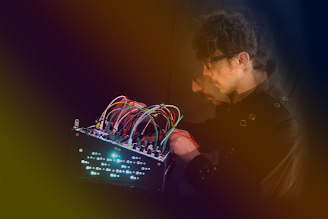Mac Hertz
...is an electronic music artist who explores the intersection of techno and IDM. He is driven by a passion for cutting-edge and unconventional artistic expressions. He liberates himself from the norms and harnesses the power of spontaneity. His eclectic influences range from Thom Yorke to Aphex Twin, from DJ Hell to Throbbing Gristle. His release, Bed & Breakfast, is a sonic journey along the highway ramps. The listeners are carried away by the spectral beats as they glide past the urban landscapes. The track showcases the gritty textures and pounding drums of industrial techno.
How did you develop your artistic identity and what kind of influences shaped your music?
My perception of the world directs the construction of my identity. We feel that technology is rational, that it makes the future secure and predictable, but the exact opposite is happening. Technology manifests itself as an extension of life with its accidents and imperfections. Then technology can generate a dark, melancholy, noisy or industrial energy… The influences that convinced me of this are many and varied. We can mention Aphex Twin, Joy Division, James Holden, Sonic Youth, Radiohead, Brian Eno…
What was the main idea behind your new song “Bed & Breakfast”?
As the track progresses, the names of medium-sized French towns are chanted. I imagined a trip crossing these cities without ever visiting them. We sleep in suburban hotels and then spend our day traveling from one city to another along highways.
How do you select the musical elements that best express the mood and atmosphere of each song?
I like to work without preconceived ideas. I start by experimenting with sound textures and melodic atmospheres, then I let myself be guided. It's like in a maze. We open all the doors, until we find the right one.
What are the main steps and challenges of your artistic process when you create a new track?
Each track must be different from the previous one in its creative process. I try to conceive each track as a living being with its own internal logic. Automation allows you to control processes on the machine that make the music evolve autonomously.
How do you perceive the role and impact of social media on the music scene?
Social media try to capture the attention of their users to sell their data for advertising purposes. We are slaves to this as we are slaves to the oil industry. The advantage is that they allow a direct link with the public without any intermediary. The downside is that they encourage artists to be omnipresent. An artist must devote a large part of his time to it at the detriment of creation. All this has considerably upset the rules of the music industry.
What is your opinion on “AI-music” and its potential for innovation or disruption?
The intermediaries between the artist and his music are increasingly complex. With a piano, a key activates a hammer which makes a string vibrate. With a computer, these are increasingly complex algorithms. To create, you don’t have to imagine the music, but you have to imagine the algorithms that generate it. It's very interesting. The role of the artist is changing.
What are your aspirations and plans for your musical career?
The first step for me is to successfully swim in the middle of the ocean. There is so much music today that it is really difficult to exist. Then in the future, I would like to invent new relationships with music. 150 years ago you couldn't hear music without musicians. Today music is ubiquitous because it is recorded. We feel like this is normal. But we can bet that we will have a completely different relationship to music in the future. I think about it a lot at the moment and I hope it will influence the way I create.

